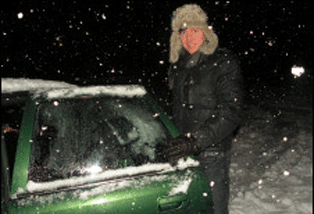Damien McGuinness
BBC Caucasus Correspondent
BBC Caucasus Correspondent Damien McGuinness recalls a personal experience of Georgian hospitality when his team got caught in a snow storm while reporting on a controversial land sale scheme.
A guest is a blessing sent by God, say people in the Caucasus.
Certainly the nation of Georgia is offering a more than hospitable welcome to farmers from South Africa.
And it’s something we experienced ourselves while filming the story of how some 90 white South African farmers have visited Georgia, after an invitation from the government to look at state-owned land for sale.
Changing continents
Police had blocked the route, telling us they would only allow us through in a jeep – could prove tricky to find a jeep in the middle of the night in the mountains, I thought BBC Caucasus Correspondent Damien McGuinness.
Many of the farmers say they don't feel safe in South Africa. Since Apartheid ended in 1994, more than 3,000 white South African farmers have been murdered.
And some believe that land reforms will mean that the South African government will force them to sell their farms for less than market value.
“The government can come to you and tell you, this is what we are willing to pay for your farm and you have to sell,” explained Johan Swart. “You can lose everything.”
He has come to Georgia with his wife and parents to look at farms for sale. The Georgian government is giving advice about where to buy land and how to settle here.
It is also prepared to reduce the price for land if the South Africans farmers create jobs in Georgia.
Plans ditched
Critics say that Georgian farmers are not receiving such support from their own government.
In the former Soviet Union, farms were collectivised, so many farmers lost their traditional skills. Now they need advice and access to affordable loans to become productive again.
Some worry that attracting richer, foreign farmers will put Georgian farmers at a competitive disadvantage.
But as we drove along the snowy mountain roads behind the farmers in their convoy of jeeps, our immediate concern was just keeping up. The convoy's original plan of stopping after an hour to do the interviews appeared to have been ditched.
By the time they eventually stopped – not far from the coastal town of Batumi, where the South Africans were spending the night – we'd driven almost 400 kilometres and across most of the country.
Magic phone
As we headed back to Tbilisi through the mountains, the snow got heavier and progress slower.
Things finally ground to a halt on the mountain pass – the only road back to the capital.
Police had blocked the route, telling us they would only allow us through in a jeep – could prove tricky to find a jeep in the middle of the night in the mountains, I thought.
At this point, however, I hadn't banked on the talents of our fixer Mariam Naskidashvili, whose mobile phone appears to have magical qualities.
She had been putting in a few calls. "A friend has a jeep that they can send with a driver," she said.
Generally in Georgia the solution to most problems is 'a friend' or 'a cousin'. It's rare that you get more detail than that.
Police escort
By the time the jeep arrived around midnight, the snow had got heavier and traffic that had become stuck on the mountain pass meant the road was completely blocked.
With no hotels nearby, it was looking like the five of us would soon spend a cosy night in the car with the camera equipment.
Mariam got on her magic phone again and spoke to someone who told her there was a border guard barracks nearby where we could sleep free of charge.
Suddenly a convoy of police cars with flashing lights appeared to escort us through the village to the barracks.
I kept thinking we looked a little too dirty, tired and generally bedraggled to warrant all the attention.
Welcoming culture
The next morning, with the road still blocked, a border guard in a jeep said he would take us to Tbilisi.
He managed to bypass the traffic jam on the mountain pass by taking the other side of the road, warning cars coming the other direction to steer clear by beeping his horn most of the way.
We arrived back in Tbilisi almost 24 hours later than expected. Even by relaxed Georgian standards, this was quite a delay.
But the fact that we'd made it back at all and managed to get a good night's sleep on the way was only thanks to Georgian hospitality.
Despite the internal controversy surrounding the government's initiative, many of the South African farmers we spoke to have been similarly impressed by how they've been received.
And if our experience out in the countryside is anything to go by, any farmers who do end up settling here should get a warm welcome.
http://www.bbc.co.uk/worldservice/worldagenda/2011/02/110228_worldagenda_georgia_farmers.shtml




